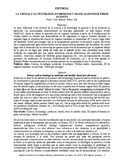| dc.rights.license | http://creativecommons.org/licenses/by-nc-sa/3.0/ve/ | es_VE |
| dc.contributor.author | Salinas, Pedro José | |
| dc.date.accessioned | 2019-11-27T16:51:03Z | |
| dc.date.available | 2019-11-27T16:51:03Z | |
| dc.date.issued | 2019-11-27 | |
| dc.identifier.uri | http://www.saber.ula.ve/handle/123456789/46313 | |
| dc.description.abstract | Se hace referencia a los avances de la ciencia y la tecnología en general y de la medicina en particular (ya
mencionados anteriormente en artículos publicados en esta misma revista MedULA), ahora se indica la
reproducción de órganos humanos a partir de la implantación de células madre en ratones que
desarrollarán en su organismo el órgano humano deseado, en segundo lugar la reproducción exacta de
órganos humanos en impresoras 3D y tercer lugar están los llamados “bebés por encargo” que es la
manipulación genética en humanos, a partir del óvulo y/o el espermatozoide para obtener bebés con las
características deseadas por los padres. En cuarto lugar está el desarrollo de un microchip de apenas
milímetros de dimensión que se implanta debajo de la piel en un lugar que pueda ser leído por el aparato
lector, este microchip tiene varios terabytes de capacidad por que puede almacenar mucha información
del individuo portador (nombre., dirección, número de teléfono, grupo sanguíneo, etc., esto es
especialmente útil para personas con problemas de memoria (Enfermedad de Alzheimer, etc.), ya se está
usando en Estados Unidos en mascotas que si se pierden pueden ser recuperados al leer el microchip. | es_VE |
| dc.language.iso | es | es_VE |
| dc.publisher | SaberULA | es_VE |
| dc.rights | info:eu-repo/semantics/openAccess | es_VE |
| dc.subject | Ciencia | es_VE |
| dc.subject | Medicina | es_VE |
| dc.subject | Tecnología | es_VE |
| dc.subject | Células madre | es_VE |
| dc.subject | Impresiones 3D de órganos humanos | es_VE |
| dc.subject | Microchips | es_VE |
| dc.subject | “Bebés por encargo” | es_VE |
| dc.title | La ciencia y la tecnología en medicina y salud. Algunos últimos avances | es_VE |
| dc.title.alternative | Science and technology in medicine and health. Some last advances | es_VE |
| dc.type | info:eu-repo/semantics/article | es_VE |
| dc.description.abstract1 | Science and technology in medicine and health. Some last advances.
Reference is done to the advances in science and technology in general and in medicine in particular
(mentioned in previous papers in this same journal Med ULA, now we refer to the reproduction of human
organs by implantation of stem or mother cells in mice that will develop in their organism the needed
organ, in second place is the exact reproduction of human organs from 3D printers, in third place are the
so called “babies by order” that is the genetic manipulation in humans of the ovum and/or spermatozoon
in order to obtain babies with the parents wished characteristics, and in fourth place is the development
of a microchip measuring only a few millimetres that is implanted under the skin in a place that can be
read by the reading device, this microchip has several terabytes of storage capacity and therefore can hold great amount of information of the porter individual (name,
address, phone number, blood type, etc., this is especially useful for persons with memory problems (Alzheimer Disease, etc.), it is already used in USA in pets that,
if lost, can be recovered by reading the chip. | es_VE |
| dc.description.colacion | 4-5 | es_VE |
| dc.description.email | psalinas@ula.ve | es_VE |
| dc.description.frecuencia | Semestral | |
| dc.description.paginaweb | http://www.saber.ula.ve/medula/ | |
| dc.identifier.edepositolegal | ppi 201202ME4101 | |
| dc.identifier.eissn | 2244-8829 | |
| dc.publisher.pais | Venezuela | es_VE |
| dc.subject.institucion | Universidad de Los Andes | es_VE |
| dc.subject.keywords | Science | es_VE |
| dc.subject.keywords | Technology | es_VE |
| dc.subject.keywords | Medicine | es_VE |
| dc.subject.keywords | Health | es_VE |
| dc.subject.keywords | Stem or mother cells | es_VE |
| dc.subject.keywords | 3D prints of human organs | es_VE |
| dc.subject.keywords | Microchips | es_VE |
| dc.subject.keywords | “Babies by order” | es_VE |
| dc.subject.seccion | Revista MedULA: Editorial | es_VE |
| dc.subject.tipo | Artículos | es_VE |
| dc.type.media | Texto | es_VE |


